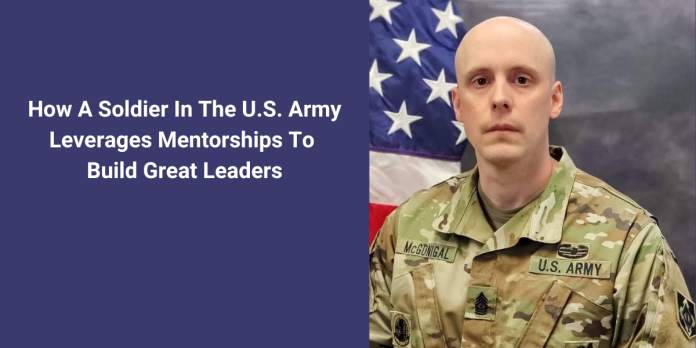
U.S. Army Course Chief of Basic Leadership 1st Sgt. Mike McGonigal can trace his career path back to a pivotal conversation with his father some 19 years ago: “When I was a young buck in the Army, I said something crazy to my dad. I told him I wanted to be just like him. And he responded, ‘I absolutely want you to be nothing like me.’ He said, ‘I worked this hard with you so that you could always be better than me.’”
 For McGonigal, this advice was formative. From that point forward, he forged his own path and measured success his way. The conversation also inspired a core piece of McGonigal’s leadership philosophy that he now brings as the Course Chief for the Basic Leadership Course: Learn from the mistakes and successes of more senior, more experienced leaders.
For McGonigal, this advice was formative. From that point forward, he forged his own path and measured success his way. The conversation also inspired a core piece of McGonigal’s leadership philosophy that he now brings as the Course Chief for the Basic Leadership Course: Learn from the mistakes and successes of more senior, more experienced leaders.
In the Basic Leader course that McGonigal heads out of the Maneuver Support Center of Excellence Noncommissioned Officers Academy, Fort Leonard Wood, Missouri, junior soldiers learn how to become junior leaders (of typically two to three people). Their Basic Leadership Course is a 22-day intensive running Monday through Saturday, spanning 169 hours of learning and practice (you can see the hourly breakdown here). The audience spans every part of the Army: Military police, engineers, bomb techs, supply techs, human resources personnel, and more.
McGonigal described how the variety of backgrounds helps bring together various perspectives and experiences around leadership. “In the Basic Leader Course, because we are talking to all walks of life in the Army, the most diverse group that I've honestly seen, our ability to expand on the actual concept of leadership and go specific to leadership only and not to any one job description helps them understand and learn.”
McGonigal described the core topics and feel of the Basic Leadership Course: “We are there in the morning to start with physical fitness training. Then, we cover key topics like Public Speaking. We assess them on their ability to give a brief on a specific topic within a set parameter, timeline, and so on. We also teach them how to conduct training and assess them on that. We look at their ability to lead formations, either marching or physical fitness. For context, these topics of Public Speaking and Leading Exercises are two of the biggest assessments. We teach key leadership aspects as well, such as how to do evaluations, how to counsel, how a junior leader should talk to one of their subordinates, and effective communication. We even have them writing APA formatted essays.”
“Ultimately,” McGonigal said, “this is the class where soldiers learn that leadership is much more than what they thought.”
How McGonigal Designed A Mentorship Program For Deep Leadership Discussions
Inspired by his conversation with his father nineteen years ago, McGonigal designed and launched a mentorship program where Senior NCOs (non-commissioned officers) meet with the junior leaders in his course. They discuss their perceptions of leadership and their experiences with leadership. The idea is that senior leaders can pass along their learnings and experiences. When senior leaders get vulnerable and open up about the challenges they’ve faced and the ways that they’ve failed, young leaders can learn and progress faster.
In the Army, where rank holds such significant value, junior leaders and soldiers are often hesitant to have an open conversation with more senior leaders who are two levels above them and a decade more experienced. What McGonigal has done with these mentorship conversations is to create and set up a psychologically safe environment that breaks down the walls that rank puts up. McGonigal said, “In an organizational environment, I have to worry about whether that specialist is willing to talk to that staff sergeant or sergeant first class in their unit because they don’t want to look dumb or ask a question. Here, there’s no harm done.” Junior NCOs are given a guided set of questions but encouraged to go “off-script” to ask about their specific situations and have more open conversations. “Every leader has something they look back on and wish they had done differently or better. This allows that leader to mentor the junior leader and help them get it right.”
One senior leader who participated as a mentor, Staff Sgt. Shane Ladd, described in a separate interview about the mentorship program how impactful these conversations are: “The only difference between this young sergeant and me is that I joined first, and I got where I’m at because I’ve been in for nine years and I went through everything that I’ve been through. Eventually, he’ll be in my shoes, so it’s about sharing what issues you went through.”
Preparing Leaders To Achieve Their Potential
McGonigal emphasizes that leadership is people-first and unique to each leader. As a leader himself, he put together five leadership competencies:
Relevance – “I believe that in any job description you could ever have, the higher you progress, the more difficult it is to remain relevant as those junior soldiers and leaders are the individuals completing tasks and making things happen. This is not always bad, as it could mean that you did your job preparing them to work without oversight. So I’m always asking myself, what can I do to stay relevant? What can I provide to help these leaders?”
Accountability – “Some leaders are quick to say you did A, B, and C wrong, and we’re very slow to say how good you’re doing. I believe that a leadership fundamental is accountability in all facets—good and bad.”
Effective & Efficient – “People will tell you that you can have efficiency or effectiveness. I disagree. You need to have both. There’s a difference between being finished and being finished successfully.”
Be the Best – “It’s like the Mario Kart ghost races against your previous self. If you continuously work on making yourself better than who you were yesterday, there’s a solid chance you'll be the best leader for those you lead. Focus on being the better version of yourself, and don’t worry about everyone else. You will surpass them with each daily improvement.”
McGonigal tied each of his Leadership Five back to his ability to make an impact as a teacher and Course Chief. One thing that was clear throughout the interview: In the same way that his father’s comment prepared him to have a better career than his father, McGonigal is seeking new methods and ways to refine the Basic Leadership course to ensure soldiers in his program will fulfill their career potential and learn from the senior leaders above them.






